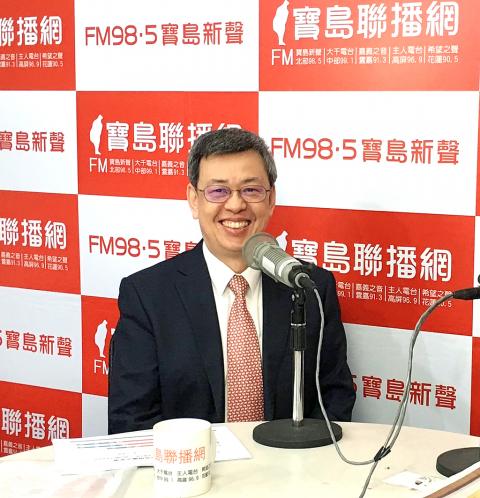The government is to phase out the 18 percent preferential savings rate for retired public-sector employees over a period of six years, Vice President Chen Chien-jen (陳建仁) said yesterday.
In a radio interview, Chen said that the government plans to lower the 18 percent interest rate in stages over six years.
For people taking monthly retirement payments, the rate will be adjusted to 9 percent in the first two years after retirement, then to 6 percent in years three and four and 3 percent in years five and six. There would be no preferential interest rate after that, he said.

Photo: courtesy of Super FM98.5
However, to care for less-well-off retirees, the 18 percent preferential rate would remain for people below a salary floor, which is to be set at either NT$25,000 or NT$32,000 (US$791 or US$1,013) a month, pending further discussions, he said.
Pensioners who take a lump sum would be entitled to higher interest rates, Chen said, without specifying the rate.
The 18 percent preferential interest rate for retired military officials, civil servants and public-school teachers was introduced in 1960 when the average income for the three professions was lower than most other careers.
The government originally planned to scrap the preferential rate, but has decided to take a milder approach, Chen said.
“A pension [fund] is like a feeble goose, which has to lay eggs larger than it can handle every day. There will be no more eggs when it cannot stand anymore and dies,” Chen said. “However, a healthy goose that only has to lay normal-sized eggs can continue [to survive] and give birth to goslings.”
Under the pension system, the pension of a person who begins work at 25 and retires at 55 is only enough to cover 10 years of pension payments, Chen said.
By the age of 65, the person would be receiving pension payments covered by others’ contributions, he said.
With a retirement age of 50, due to the nation’s average life expectancy, women can expect to receive pension payments for 33 years and men for 27 years.
To ensure a sustainable pension system, the retirement age needs to be set at 55 and the income replacement ratio lowered from 80 percent to 60 percent, with the pension contributions of employees and the government raised from 12 percent to 18 percent, Chen said.
Meanwhile, amid accusations that the government has not been transparent in its organization of a national conference on pension reform, which is to be held on Sunday at the Presidential Office Building, Chen said the Presidential Office is always “fair and honest.”
Calling on opponents of the government’s pension reform plans to express their opinions at the conference peacefully, Chen said opponents have mobilized protesters in a “warlike fashion,” which is inappropriate conduct in a democratic society.
Although invited to attend the conference, the Chinese Nationalist Party (KMT), the New Party and the Taiwan Solidarity Union have yet to nominate representatives, Chen said, encouraging the parties to participate.

CHAOS: Iranians took to the streets playing celebratory music after reports of Khamenei’s death on Saturday, while mourners also gathered in Tehran yesterday Iranian Supreme Leader Ayatollah Ali Khamenei was killed in a major attack on Iran launched by Israel and the US, throwing the future of the Islamic republic into doubt and raising the risk of regional instability. Iranian state television and the state-run IRNA news agency announced the 86-year-old’s death early yesterday. US President Donald Trump said it gave Iranians their “greatest chance” to “take back” their country. The announcements came after a joint US and Israeli aerial bombardment that targeted Iranian military and governmental sites. Trump said the “heavy and pinpoint bombing” would continue through the week or as long

TRUST: The KMT said it respected the US’ timing and considerations, and hoped it would continue to honor its commitments to helping Taiwan bolster its defenses and deterrence US President Donald Trump is delaying a multibillion-dollar arms sale to Taiwan to ensure his visit to Beijing is successful, a New York Times report said. The weapons sales package has stalled in the US Department of State, the report said, citing US officials it did not identify. The White House has told agencies not to push forward ahead of Trump’s meeting with Chinese President Xi Jinping (習近平), it said. The two last month held a phone call to discuss trade and geopolitical flashpoints ahead of the summit. Xi raised the Taiwan issue and urged the US to handle arms sales to

BIG SPENDERS: Foreign investors bought the most Taiwan equities since 2005, signaling confidence that an AI boom would continue to benefit chipmakers Taiwan Semiconductor Manufacturing Co’s (TSMC, 台積電) market capitalization swelled to US$2 trillion for the first time following a 4.25 percent rally in its American depositary receipts (ADR) overnight, putting the world’s biggest contract chipmaker sixth on the list of the world’s biggest companies by market capitalization, just behind Amazon.com Inc. The site CompaniesMarketcap.com ranked TSMC ahead of Saudi Aramco and Meta Platforms Inc. The Taiwanese company’s ADRs on Tuesday surged to US$385.75 on the New York Stock Exchange, as strong demand for artificial intelligence (AI) applications led to chip supply constraints and boost revenue growth to record-breaking levels. Each TSMC ADR represents

State-run CPC Corp, Taiwan (CPC, 台灣中油) yesterday said that it had confirmed on Saturday night with its liquefied natural gas (LNG) and crude oil suppliers that shipments are proceeding as scheduled and that domestic supplies remain unaffected. The CPC yesterday announced the gasoline and diesel prices will rise by NT$0.2 and NT$0.4 per liter, respectively, starting Monday, citing Middle East tensions and blizzards in the eastern United States. CPC also iterated it has been reducing the proportion of crude oil imports from the Middle East and diversifying its supply sources in the past few years in response to geopolitical risks, expanding